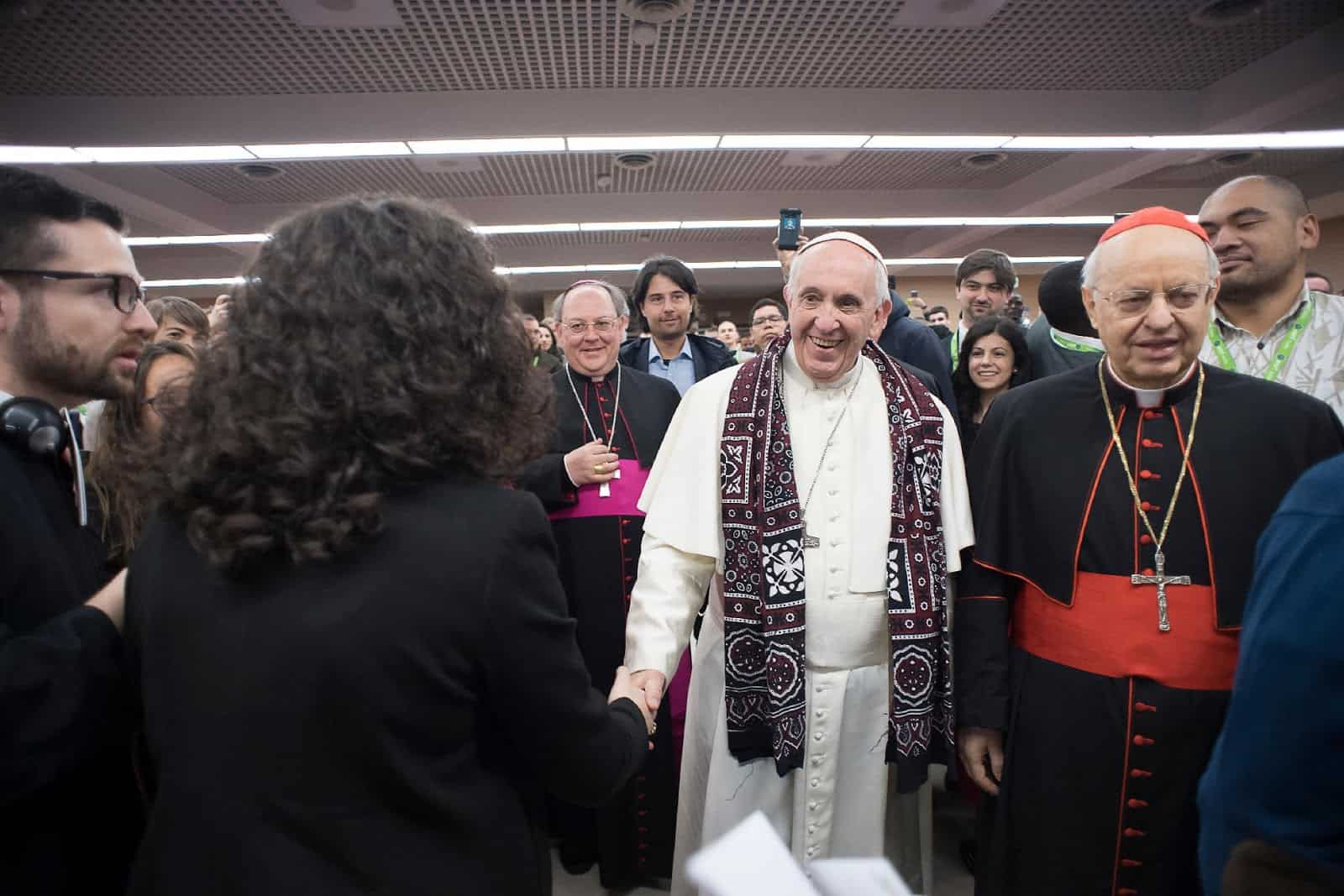Pope Francis has convened the 15th Synod of Bishops for October 2018. A synod of bishops brings together bishops from around the world, to discuss important topics in a fraternal way with the Pope, their brother bishop and leader. The 15th Synod has as its focus “young people, faith, and vocational discernment.”
Pope Francis invited 300 young people from around the world to come together in Rome for one week as a Pre-Synodal meeting – a gathering that issued a document to inform the Synod’s work in October. The below interview is with Nicole Perone, a U.S. delegate to the meeting and an author of the document.
***
TJP: What was your experience of the meeting?
I imagine that I will be processing the experience of the Pre-Synodal Meeting for quite some time. The week began with our Holy Father, Pope Francis, spending much of his day with us, hearing testimonies of the experiences of young people from different regions and responding to questions. I also had the unbelievable opportunity to personally meet Pope Francis, the catalyst for the gathering. It was deeply moving for me to have such an encounter with someone who has so inspired me and countless herbs, and who believed the voices of young people needed to be heard.
By sheer divine providence, I was selected to be on the writing committee of the document which the Pre-Synodal Meeting was tasked to produce, and for me that was one of the most profound aspects of the week. To be honest, we all carried the responsibility as an immense honor and burden, to collect all that we heard and read and saw into a concise document. By the end of the week, seeing how we young people had come to take ownership of the process and the document bearing our name, I realized that a great burden can sometimes be the gateway to great joy.
The experience of the week which was most striking to me was the realization of how BIG the Church is. To spend my days with young people from sub-Saharan Africa, the furthest reaches of Asia, all living experiences I can only imagine, was breathtaking. They see the Church through many lenses and live out their faith in many different ways. It certainly presented a challenge when writing the document, because of the sheer breadth of lived experience that needed to be summarized. It also heartened me to see the threads of unity which bound us all, the same concerns which arose and the same spots of joy we sought.
TJP: What are your hopes for the Synod?
My primary hope for the Synod of Bishops is that the Synod Fathers read well the instrumentum laboris, especially the Pre-Synodal document, and take to heart what is written therein. The Pre-Synodal document is not meant to be a theological treatise or a “how-to” guide, but really to lay out clearly to the Synod Fathers the state of young people in the world today, and invite them to act on what they see there. I hope that the Synod Fathers will use the document weyoung people produced as a lens to view the plight, situation, and status of young people throughout the world. I pray that the seeds which have been sown in the document take root in the hearts of the Synod Fathers and bear good fruit in dioceses around the world – that the Synod is not platitudinal but really transformative for our Church.
TJP: How has the experience of attending this meeting affected you? Did it lead you to new commitments, or reinforce ones you already had?
The global context of the Pre-Synodal Meeting was one of the most impactful aspects, because it provided much-needed perspective: the issues which we think are of paramount importance can be far from the needs of our brothers and sisters. It is easy for all of us to get caught up in our own contexts and the issues that reign supreme there – but we are a truly catholic (yes, “little c”) Church, and so all that we do is inextricably bound up in the reality that our vision must extend beyond the bounds of the Church in Connecticut, in the Northeast, or in the United States. I have tried to hold that in my heart as I return to my work.
Additionally, it has been challenging for me that most average Catholics have no idea what a Synod is or that one is taking place at all, let alone the Pre-Synodal Meeting. I feel that the work done that week in Rome was so important, but it has been humbling to acknowledge that the world kept spinning. It then presents an opportunity for evangelization of sorts: to share the magnificence of 300 young people, many of whom know and love Jesus, who came together for this historic moment to speak on behalf of their generation to an ancient institution. Those who were there have the responsibility of sharing with others the hope that was palpable and to enter into conversation – not only about what is written in the document, but about the experiences of young people in the Church moving forward. Therefore, it can truly be a banner moment of hope, if we let it be so.
TJP: The role and status of women is an important issue for young people and you address that in the document in a few places. Could you talk more about the discussion around that issue in the pre-synod meeting and discernment?
I can only speak to my personal experience of the Pre-Synodal meeting, but the topic of the role of women came up quite strongly and clearly in both my English-language working group and in the writing committee. Even after the first and second drafts of the document, I was really moved by how clearly the plenary of the Pre-Synodal meeting spoke to us on the writing committee, asking for incisive statements about the role of women in the Church. This was especially relevant to the section on vocation and discernment, because of the challenge young women face in understanding potential ways that they can share their gifts with the Church. The role of women in the Church is clearly one of the rare issues which transcends geographical location, which then seems to me to be of paramount importance for the Synod Fathers to address. Young people desire to see women in visible roles of authentic leadership in the Church, and this was made clear during the feedback given on each draft of the document.
TJP: Could you share your own experience of being a young woman in the Church?
Being a young woman in the Church is not without its challenges – both as a young person and as a woman – but I believe it is a moment of incredible opportunity to be a young woman in the Church today. I have been blessed beyond words to have been nurtured and supported by mentors: women of faith and joy who love the Church and rejoiced in the opportunity to walk alongside a young woman discerning how best to serve the Lord. My own journey of vocational discernment has been immeasurably enriched by mentors, once young women in the Church themselves, being unabashed in their commitment to the Church and to supporting future generations. (Indeed, the Pre-Synodal document speaks very clearly on matters of mentorship, and it was very moving for me to be a part of writing that.)
Additionally, I have had the extraordinary opportunity to serve as Archdiocesan Director of Adult Faith Formation – directorial positions in a diocese are not often staffed by young adults. I cannot thank and celebrate enough Archbishop Blair and our Provost, Sr. Mary Grace Walsh, for truly “walking the talk” of empowering young people to lead in this way. Occasionally, I find myself in situations where I am not taken as seriously as an older colleague might be, and sometimes (not through any ill will) some treat me like a child because I am the age of their child (or even grandchild). However, I see all of these moments as teachable for all parties involved, and I have grown personally and professionally from being a young woman in the Church at this moment.
TJP: The document calls art and beauty “an untapped potential.” What did the delegates have in mind?
Many of the delegates that I met from around the world had each had profound experiences of beauty that moved them closer to God. Expressions such as visual and musical arts, encounters with nature, and literary/poetic works can all be avenues that lead us closer to God. Of course, another such avenue would be the beauty of the Mass and of our churches, which continue to inspire awe even in those who are not of the faith. In general, the practices of art and beauty should be explored more deeply as young people are drawn to such things as secular practices or aspects, but if rooted in faith, can be gateways for young people to come to know and love Jesus and the Church.
TJP: Why is it important for Catholics to read this document? What is its biggest strength? What is the most important message it conveys?
In order to understand why the document is worth reading, it is important to name one major reason why the Pre-Synodal Meeting matters: it actually called together the topics of the conversation to be protagonists of the conversation, to create space which became the conduit for the views, needs, struggles, and dreams of young people. It is authentic to actually bring the people that you are talking about to the table, and invite them to help shape the conversation in a way that is faithful to their lived experience. This is what Pope Francis did by asking us young people to be present: have a hand in the ways the Church will hear, understand, and engage with us. Of course those who work with young people in any capacity of their ministries should read this document (from those in our Catholic schools to youth and young adult ministers to evangelization ministers) but truly, I feel that it is accessible to many faithful Catholics who have an interest in ensuring a Church that is welcoming to young adults and thus sustainable for the future. To that end, this document is worth reading because it is a frank yet hopeful explanation of the state of young people, directly from young people themselves. Its greatest strength is its frankness, and its most important message is the hope which lives in every opportunity we as a Church have to engage with, invite, and minister to young people.
***
Perone was interviewed for The Jesuit Post by Billy Critchley-Menor, SJ and Bill McCormick, SJ.


